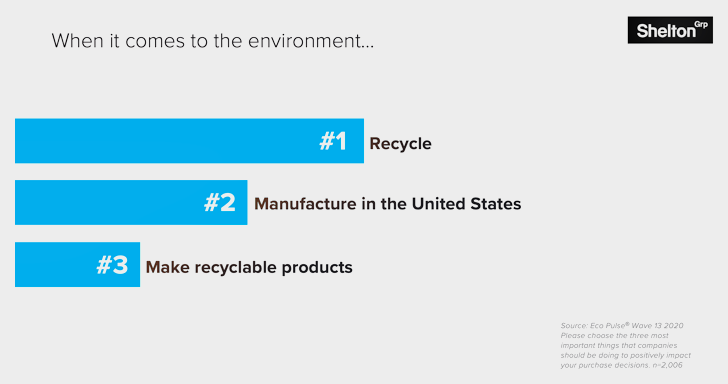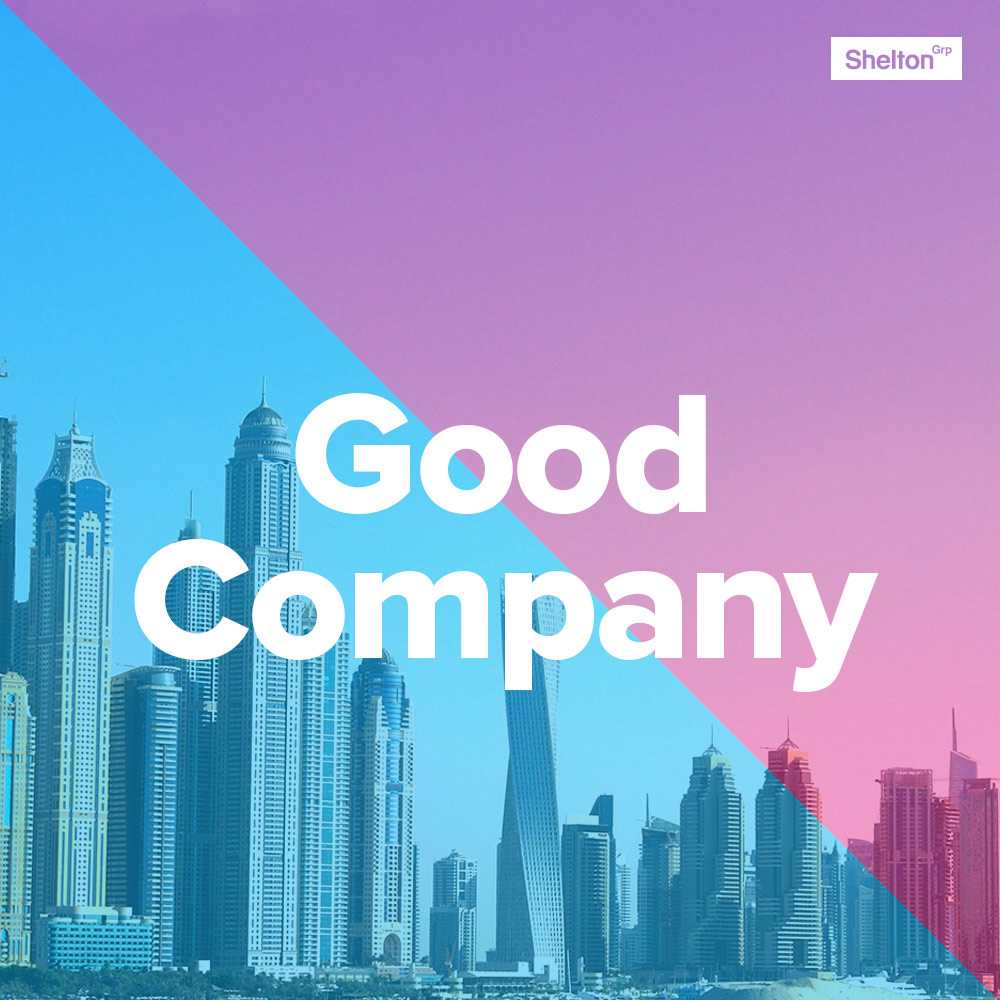Three reasons why your brand needs a recycling story
Shelton Stat of the Week
20% of Americans say recycling is the number one action – out of 28 actions tested – companies can take to positively impact their purchase decision.
If you’ve read our Good Company report, you already know that around 42% of Americans want to be seen as someone who buys eco-friendly products, and 26% can name a brand – unaided – that they’ve purchased or not purchased because of the environmental or social record of the manufacturer. You also know that how well you’re taking care of your people is what impacts Americans’ favorability towards your brand the most.
But there’s another clear mandate from consumers right behind that: recycling. When asked, “Please choose the three most important things companies should be doing to positively impact your purchase decision,” “recycle” comes out on top, and “make recyclable products” rounds out the top three answers.
So…why? If you’re reading this you know that there are much bigger initiatives companies can and should be doing to reduce their environmental impact, so why are Americans fixated on recycling?
Three reasons:
- They’re still more worried about plastics in the ocean than climate change. We uncovered that this was the case back in 2019, and it’s held true even through our surveying during the pandemic. For many Americans, plastics in the ocean is THE issue we need to tackle, largely because all of us are complicit in it. (That could be MY plastic bag around that turtle’s neck!) This is a highly visual, tangible problem that we can all see our part in, and we want it to stop. But for those consumers who are actively trying to reduce their single-use plastics purchases – a third of the population pre-pandemic, a quarter during the pandemic – they’re forced to buy plastic packaging to get the products they want, and so they put the onus on manufacturers and brands. In other words, “If you’re going to make me buy single-use plastic packaging that I don’t want to buy, then it’s on you to ensure that plastic is made from recycled content and that it’s recyclable.
- Recycling is a giant get-out-of-guilt free card. Many of us feel a little guilty about all that we buy and throw away. Just think for a second about the word “waste.” It’s never used to connote something positive – “waste not want not” comes to mind, as does, “that guy at the bar is so wasted” – so none of us wants to be a “waster.” If we didn’t have a recycling bin, we’d be rolling two garbage cans to the curb each week instead of one, and we’d feel really bad about it. So we BELIEVE in recycling – even for the 39% of Americans who are aware that there are challenges with the current recycling system, 97% haven’t changed their recycling habits. And that belief extends to the brands we identify with and purchase – we expect brands to hold themselves to the same standard we hold ourselves to, and we expect them to recycle their waste versus throwing it in a landfill.
- We’re starting to lose faith. Interestingly, though, in 2019, only 15% of Americans said they didn’t feel confident that what they put in the recycling bin was actually recycled. One year later, that number jumped to 23%. That puts ever more expectation on brands. If I can’t feel sure that what I put in the Blue Bin is actually recycled, then I need to know that brands are trying to handle this for me, recycling their own waste and making packaging from recycled content.
There’s a huge opportunity for brands to tell their stories – about how you’re managing waste on your factory floors, but also about how you’re working to use packaging materials that genuinely are recyclable. There’s also a high degree of risk here. Until chemical recycling becomes commonplace, any plastics labeled 3-7 largely aren’t being recycled. So when a brand slaps the chasing arrows encircling a number other than a 1 or a 2 on their packaging, they’re really greenwashing, I’m afraid. And when consumers find out, there will be a backlash. They will feel betrayed and lied to. And that’s not the relationship you want to build between your brand and your buyers.

Brands, you need to listen to the conscious consumer of the future
— Forbes
According to Forbes, over the last year, many of us have become much more conscious of the way we shop, consume, and dispose of everyday items. Yet the reality is that changing consumer habits is still only a drop in the ocean. Real change will only come when the world’s biggest businesses step up to the plate – but many of the actions they are focused on now are too little, too late. Forbes adds that what’s needed is a complete overhaul, from start to finish, of how a business operates – no matter its size or scale [and] to do so in a way that creates the most value means grounding sustainability in what consumers want and need. Read more…

How your business can encourage employees to go green
— Environmental Protection
Recycled and recyclable packaging are great, but consumers care about how your company behaves when it comes to recycling too. This article by Environmental Protection says, “As a business owner, you have the power to positively impact the planet. It takes various resources to run a successful company, and the greener you make your process, the better the environment will fare. Your employees play a significant role in achieving those goals.” Learn about ideas to help your company recycle more and to get your employees more involved in keeping your company green. Read more…
Good Company
Americans are putting their wallets where their values are. They buy brands (or those brands’ competitors) based not just on corporate behavior, but on how that behavior is perceived.
So how do you protect your bottom line and safeguard your reputation, all while making the world a better place? Well, good works. That’s the simple truth, and as you’ll learn in this report, Shelton Group has the research to back it up.
You’ll also learn how your brand can apply our insights to share your good stories in ways that captivate the public’s passion – so you can gain a market advantage.



-
TAGS:Environmental Issues